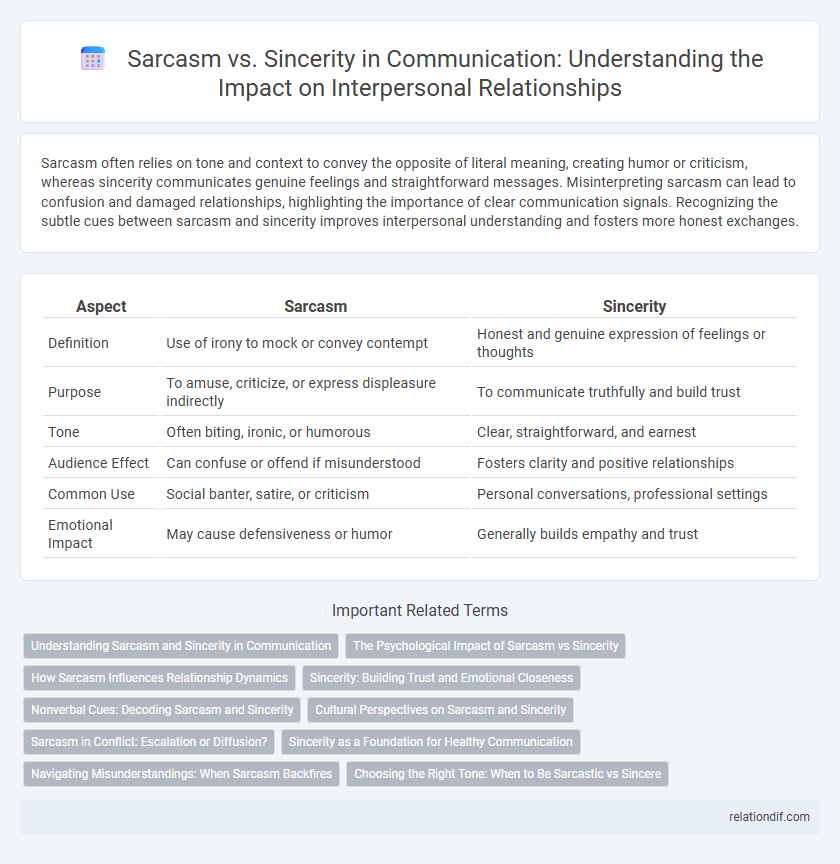Sarcasm often relies on tone and context to convey the opposite of literal meaning, creating humor or criticism, whereas sincerity communicates genuine feelings and straightforward messages. Misinterpreting sarcasm can lead to confusion and damaged relationships, highlighting the importance of clear communication signals. Recognizing the subtle cues between sarcasm and sincerity improves interpersonal understanding and fosters more honest exchanges.
Table of Comparison
| Aspect | Sarcasm | Sincerity |
|---|---|---|
| Definition | Use of irony to mock or convey contempt | Honest and genuine expression of feelings or thoughts |
| Purpose | To amuse, criticize, or express displeasure indirectly | To communicate truthfully and build trust |
| Tone | Often biting, ironic, or humorous | Clear, straightforward, and earnest |
| Audience Effect | Can confuse or offend if misunderstood | Fosters clarity and positive relationships |
| Common Use | Social banter, satire, or criticism | Personal conversations, professional settings |
| Emotional Impact | May cause defensiveness or humor | Generally builds empathy and trust |
Understanding Sarcasm and Sincerity in Communication
Understanding sarcasm and sincerity in communication hinges on recognizing contextual cues and tone of voice that distinguish genuine statements from ironic remarks. Sarcasm often involves saying the opposite of what one means, relying heavily on vocal inflection, facial expressions, and situational context for accurate interpretation. Sincerity conveys honesty and straightforwardness, essential for building trust and clear understanding in interpersonal interactions.
The Psychological Impact of Sarcasm vs Sincerity
Sarcasm often triggers defensive psychological responses, increasing stress and reducing trust in interpersonal communication. In contrast, sincerity fosters emotional safety and strengthens relational bonds by promoting transparency and understanding. Research shows that sincere communication enhances cognitive empathy, while sarcasm can impair emotional clarity and social cohesion.
How Sarcasm Influences Relationship Dynamics
Sarcasm often creates ambiguity in communication, leading to misunderstandings and emotional distance within relationships. Frequent sarcastic remarks can undermine trust and reduce relational satisfaction by signaling hostility or insincerity. In contrast, clear and sincere communication fosters emotional intimacy and strengthens interpersonal bonds.
Sincerity: Building Trust and Emotional Closeness
Sincerity in communication fosters genuine connections by promoting honesty and transparency, which are essential for building lasting trust. Expressing true feelings and intentions encourages emotional closeness, enhancing interpersonal relationships and reducing misunderstandings. Consistent sincere interactions strengthen bonds, creating a supportive environment where individuals feel valued and understood.
Nonverbal Cues: Decoding Sarcasm and Sincerity
Nonverbal cues such as facial expressions, tone of voice, and body language play a crucial role in distinguishing sarcasm from sincerity in communication. Sarcastic remarks often involve exaggerated intonation, smirks, or eye rolls that signal irony, while sincere statements typically feature consistent eye contact, relaxed posture, and genuine smiles. Decoding these subtle signals enhances interpersonal understanding and reduces misunderstandings in conversations.
Cultural Perspectives on Sarcasm and Sincerity
Cultural perspectives on sarcasm and sincerity vary significantly, influencing how messages are interpreted and communicated. In Western cultures, sarcasm is often used as a humorous or indirect form of criticism, whereas many East Asian cultures prioritize sincerity and directness, finding sarcasm confusing or impolite. Understanding these cultural differences is crucial for effective cross-cultural communication and avoiding misunderstandings.
Sarcasm in Conflict: Escalation or Diffusion?
Sarcasm in conflict often escalates tensions by introducing ambiguity and perceived hostility, which can provoke defensive reactions and misunderstandings. Its indirect nature undermines clear communication, leading to increased emotional intensity rather than resolution. Research indicates that while sarcasm may momentarily diffuse tension through humor, it predominantly acts as a catalyst for conflict escalation in serious disagreements.
Sincerity as a Foundation for Healthy Communication
Sincerity establishes trust and clarity, forming the foundation for healthy communication by ensuring messages are genuine and intentions are transparent. Unlike sarcasm, which can create misunderstandings and erode relationships, sincerity promotes openness and mutual respect. Effective communication thrives on honest expression, enabling deeper connections and conflict resolution.
Navigating Misunderstandings: When Sarcasm Backfires
Sarcasm often relies on tone and context, making it prone to misinterpretation, especially in digital communication where nonverbal cues are absent. Misunderstandings arise when sarcasm is mistaken for sincerity, leading to confusion, hurt feelings, and strained relationships. Clear communication strategies involve explicit clarification and attentive listening to ensure the intended message is accurately conveyed and received.
Choosing the Right Tone: When to Be Sarcastic vs Sincere
Choosing the right tone in communication hinges on understanding the audience and context to avoid misinterpretation. Sarcasm often conveys humor or criticism but can risk offending if the listener lacks shared background or cues. Sincerity fosters trust and clarity, making it essential in professional or sensitive conversations where genuine connection is paramount.
Sarcasm vs sincerity Infographic

 relationdif.com
relationdif.com